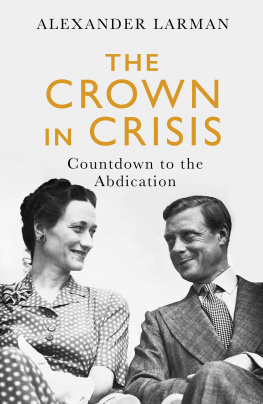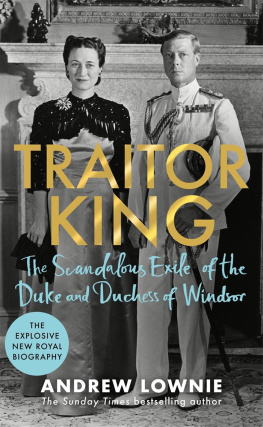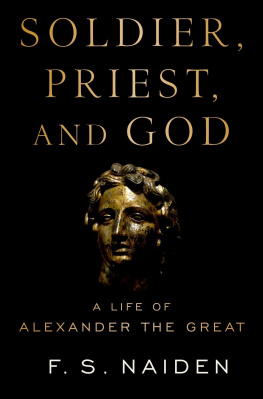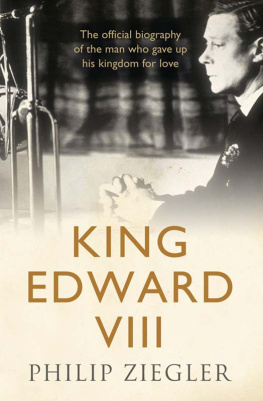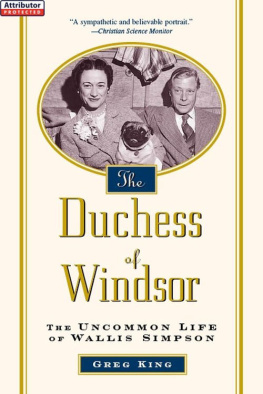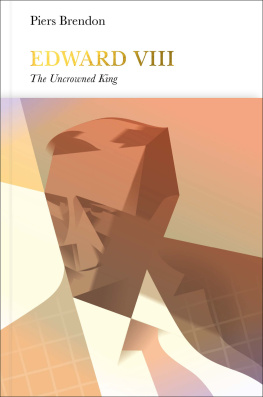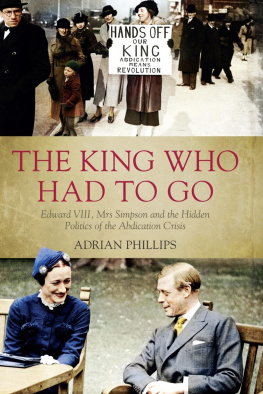Contents
For my grandmothers, Barbara Stephenson (19262018) and Terese Larman (19222019), who saw it all first-hand.
Contents
Royalty & their circle
Edward Albert Christian George Andrew Patrick David, later Edward VIII, later Duke of Windsor, Prince-turned-King-turned-Duke
Prince Albert Bertie George, Duke of York, later George VI, Edwards younger brother
George V, the late King; Edwards father
Queen Mary, Edwards mother
Prince George, Duke of Kent, Edwards younger brother
Prince Henry, Duke of Gloucester, Edwards younger brother
Mary, Princess Royal, Countess of Harewood, Edwards younger sister
Charles Edward, Duke of Saxe-Coburg, Edwards cousin
Louis Mountbatten, Edwards cousin
Elizabeth, Duchess of York, Berties wife
Princesses Elizabeth and Margaret, Berties children and Edwards nieces
Wallis Simpson, Edwards own Helen of Troy
Earl Winfield Spencer Jr, Walliss first husband
Ernest Simpson, Walliss second husband
Bessie Merryman, Walliss aunt
Freda Dudley Ward, Edwards former mistress
Thelma Furness, Edwards mistress prior to Wallis
Alec Hardinge, private secretary to Edward VIII
Helen Hardinge, wife to Alec
Sir Godfrey Thomas, assistant private secretary to Edward VIII
Alan Tommy Lascelles, assistant private secretary to Edward VIII
John Aird, royal equerry
Admiral Sir Lionel Halsey, royal equerry
Mabell Ogilvy, Countess of Airlie, Queen Marys lady-in-waiting
Ulick Alexander, royal courtier
Peregrine Perry Brownlow, Edwards lord-in-waiting
Sir Eric Miville, Berties private secretary
Edward Peacock, receiver-general of the Duchy of Cornwall
Clive Wigram, Baron Wigram, former royal private secretary
Sir William Fisher, Admiral and Commander-in-Chief of the Navy
The lawyers
Walter Monckton, lawyer and counsellor to Edward VIII
St John Jack Hutchinson, George McMahons barrister
Alfred Kerstein, George McMahons solicitor
Sir Donald Somervell, the Attorney-General
Theodore Goddard, Walliss divorce solicitor
Robert Egerton, Goddards clerk
Norman Birkett, Walliss divorce barrister
Sir Anthony Hawke, High Court judge
George Allen, Edwards solicitor
Sir Thomas Barnes, The Kings Proctor
The press
Lord Beaverbrook, newspaper magnate
Lord Camrose, owner of the Daily Sketch
Lord Rothermere, owner of the Daily Mail
Esmond Harmsworth, his son and Chairman of the Newspaper Proprietors Association
Bernard Rickatson-Hatt, Reuters editor-in-chief
Geoffrey Dawson, Times editor
John Reith, director-general of the BBC
HL Mencken, Baltimore Sun columnist
Politicians
Stanley Baldwin, Prime Minister of Great Britain
Clement Attlee, leader of the Labour Party
David Lloyd-George, former Prime Minister of Britain
Ramsay MacDonald, former Prime Minister
Neville Chamberlain, Chancellor of the Exchequer
Anthony Eden, Foreign Secretary
JCC Davidson, Chancellor of the Grand Duchy of Lancashire
Sir John Simon, Home Secretary
Duff Cooper, Secretary of State for War
Sir Robert Vansittart, Permanent Under-secretary of state for foreign affairs
David Lindsay, Earl of Crawford, former Conservative chief whip
Winston Churchill, Conservative politician
Sir Samuel Hoare, First Lord of the Admiralty
Sir Horace Wilson, senior civil servant and aide to Baldwin
Robert Bob Boothby, Conservative politician
Edward Spears, Conservative politician
Thomas Tommy Dugdale, Baldwins private secretary
Leo Amery, Conservative politician
Henry Margesson, Conservative chief whip
Oswald Mosley, leader of the British Union of Fascists
Adolf Hitler, Fhrer of Germany
Joachim von Ribbentrop, German ambassador to Britain
Konstantin von Neurath, German foreign minister
Fritz Hesse, press attach to the German embassy
Sir Eric Phipps, British ambassador to Germany
Kemal Atatrk, President of Turkey
Sir Ronald Lindsay, British ambassador to the United States
Religion
Cosmo Lang, Archbishop of Canterbury
Alfred Blunt, Bishop of Bradford
Society high
Lady Maud Emerald Cunard, society hostess and German sympathiser
Henry Chips Channon, Conservative politician and diarist
Diana Cooper, wife to Duff, the most desirable woman in England
Cecil Beaton, society photographer and diarist
Sir Maurice Jenks, Lord Mayor of London
Buttercup Kennedy, aka Mary Kirk, friend of Wallis and Ernest Simpson
Harold Nicolson, Conservative politician and diarist
Lucy Baldwin, wife of the Prime Minister
Vernon Kell, founder and first director of MI5
John Ottaway, head of the Detective Branch at MI5
Thomas Argyll Tar Robinson, MI5 operative
Carew Robinson, Home Office employee
Herman & Katherine Rogers, friends of Wallis
Osbert Sitwell, writer and wit
Margaret Aunt Maggie Greville, society hostess
Sibyl Colefax, socialite
Society low
Guy Trundle, car salesman and friend of Wallis
George McMahon, would-be royal assassin
May McMahon, his wife
Alice Lawrence, royal well-wisher and patriot
Anthony Dick, Special Constable
Alfred Kerstein, George McMahons solicitor
For Gods sake, let us sit upon the ground
And tell sad stories of the death of kings;
How some have been deposed; some slain in war;
Some haunted by the ghosts they have deposed;
Some poisond by their wives: some sleeping killd;
All murderd; for within the hollow crown
That rounds the mortal temples of a king
Keeps Death his court and there the antic sits,
Scoffing his state and grinning at his pomp,
Allowing him a breath, a little scene,
To monarchize, be feard and kill with looks,
Infusing him with self and vain conceit,
As if this flesh which walls about our life,
Were brass impregnable, and humourd thus
Comes at the last and with a little pin
Bores through his castle wall, and farewell king!
Cover your heads and mock not flesh and blood
With solemn reverence; throw away respect,
Tradition, form and ceremonious duty,
For you have but mistook me all this while:
I live with bread like you, feel want,
Taste grief, need friends: subjected thus,
How can you say to me, I am a king?
William Shakespeare, Richard II , Act III Scene II
On 8 December 1936, Evelyn Waugh wrote his impressions of the abdication saga in his diary. The Simpson crisis has been a great delight to everyone, he remarked gleefully. At Maidies nursing home they report a pronounced turn for the better in all adult patients. There can seldom have been an event that has caused so much general delight and so little pain. Waughs witty and flippant observation was accurate in one respect. But though the delight was indeed unsurpassed for some, the pain that counterbalanced it for others was equally so.
The years events were unparalleled in English history. There had been monarchs before Edward VIII who had been variously wicked, heroic, incompetent, vain and saintly. There had never been a king who had abdicated his throne so that he could marry. If previous rulers had wished to take a wife and found the status quo against them, they acted with brutal force.
Social change on this level was not an option for Edward, who lacked a brilliant and pliant advisor to bring about his desired reforms. Instead, he was pitted against the most powerful figures in British society, many of whom tried to frustrate his wishes. Some acted out of principle; others from personal animosity. It should have been an unequal contest, but Edward was both king and in possession of considerable charisma and charm. Accordingly, the battle of wits and influence that ensued was more balanced than has often been assumed. Victory was far from assured for either side until the conclusion of the crisis, and if the half-compromise, half-defeat that Edward was presented with was a triumph for the forces of establishment conservatism, it was not without significant damage to its proponents along the way.

